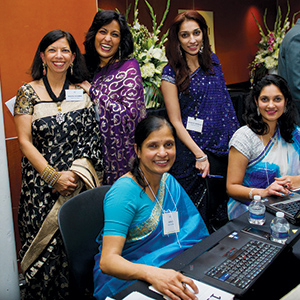

For 24 years now, Maitri has operated as a free, local and confidential nonprofit organization helping South Asian families deal with domestic violence, emotional abuse and other forms of family conflict. Its annual gala fundraising spectacular will unfold Feb. 28 at the Computer History Museum, attracting numerous Silicon Valley entrepreneurs, C-level executives and other high rollers from the South Asian community in the Bay Area.
After years of domestic violence problems in their diaspora, Maitri began in 1991 as a call-in resource for South Asian women survivors and/or those who may not feel comfortable approaching mainstream organizations. Since then, Maitri has grown into a multilayered support network, replete with trained volunteers and legal advisors, all overseeing a transitional house for survivors of domestic violence and a boutique for donated items. The annual gala is the organization’s main event.
Sonia Pelia, Maitri’s board president, has been with the organization in one capacity or another for 20 years. She told me that the cases are by no means limited to partner-on-partner physical abuse. There’s so much more involved, including emotional abuse, elderly abuse or even the effects that parent-on-parent emotional abuse have on the children—a scenario I can testify to first hand. There also exist cultural dynamics particular to the South Asian community that further complicate things. Often entering the mix is emotional abuse from extended families that aren’t normally understood by the American legal system. Or even more horrifying, in some cases, relatives back in India might be orchestrating the domestic violence over the phone, advising the abuser from afar. Some of which are scenarios unfamiliar to the more traditional American support systems.
“It’s not simple for a mainstream system to understand what’s going on,” Pelia said. “So, we function not just as education and outreach for our own community, but also for the mainstream, which is very important.”
Even though patriarchal and misogynist dynamics are often at the root of these issues, when I spoke to Maitri folks, they emphasized that man-bashing attitudes don’t help to solve anything. In fact, more and more men are coming on board to help contribute to the cause.
“The problem is not ‘he,’ the problem is our culture and how we can correct this problem,” said Vinita Gupta, an Indian businesswoman who’s been involved with Maitri since its inception. “We want men to be equal partners in resolving the problems of domestic violence. So, when we do our gala, we want men to feel like they’re part of the solution, and not people to be blamed.”
Maitri is constantly at work on new ideas. For example, last September, the Maitri Boutique opened up in Sunnyvale, providing a place where men, women and children can buy used and new South Asian party clothing and accessories. The boutique supports and funds the Economic Empowerment Programs at Maitri, with supporters and guests donating all items in the shop. The boutique has served about 1,500 customers since its launch and more than 2,000 volunteer hours have gone into the store.
However, the gala fundraiser continues to be the organization’s main event. This year’s installment will be another star-studded affair. Pelia says the event will, as always, focus on Maitri’s triumphs rather than the miserable nature of the subject matter.
“All of our galas are very positive,” Pelia says. “We celebrate our successes. We try not to focus just on the sadness of peoples’ lives, but we try to focus on the good things that have happened. We’ve grown this far, we’re helping people; more people are reaching out to us and getting substantive help.”
Gupta says the goal is simply to help out the community and bring the problems to the surface. Otherwise, they will never go away.
“We are very family-oriented people, yet there are a lot of issues that we keep putting under the rug and this is an opportunity to just say that we stand for solving the problem,” she says. “Solutions are not always obvious, but just bringing the community together and acknowledging that we do have a problem is a major step.”



